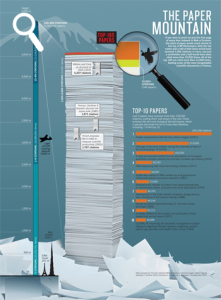A research paper by Professor Des Higgins that set the international standard for DNA sequence analysis is featured in Nature’s Top 10 most highly cited research publications of all time.
Professor Higgins is Professor of Bioinformatics at the UCD School of Medicine & Medical Science at the UCD Conway Institute. He is the only Irish scientist to be included in the Top 10, helping to boost the profile of Irish science around the world. His 1994 paper is one of only two publications in the top 10 which was published after 1993 and he also has another paper in the Top 30. Professor Higgins was named recently among the world’s top 3000 scientists in the Thomson Reuters’ List of the World’s Most Influential Scientific Minds 2014.
The citation rate of a publication captures how widely other scientists draw on that publication in advancing their own work. Having broken the barrier in 2013 of receiving over 100,000 citations by other scientists for his work, Professor Higgins has become the most highly cited Irish scientist, and amongst the most highly cited scientists in the world.
Professor Des Higgins is Professor of Bioinformatics at the UCD School of Medicine & Medical Science based at the UCD Conway Institute and is a Principal Investigator atSystems Biology Ireland. He has been working in the areas of bioinformatics and molecular evolution since 1985, predominantly on methods and software for DNA and protein sequence alignment.
In 1988 he developed the original Clustal programme for aligning protein sequences, which has made an exceptional impact in the field. The papers describing Clustal are among the most highly cited bioinformatics papers ever. One of the innovations of that programme was that the algorithm was designed to work on personal computers, which greatly increased its use among scientists and has meant it could be used in laboratories everywhere; today it is considered the industry standard.
“UCD is driven by research excellence, and the work pioneered by Des Higgins in an emerging field is testament to the value of far-reaching research. Bioinformatics fundamentally changed the field of biomedical research and has enabled many of today’s advances in personalised medicine”,
said Professor Orla Feely, Vice-President of Research, Innovation and Impact at University College Dublin.
“Des has delivered profound impact, not only academically, but also in new technology and product development. His success across the fields of biology and computer science is testament to the true interdisciplinary nature of his research”,
she added.
In the last few years, with funding from Science Foundation Ireland, his laboratory has developed and released Clustal Omega, providing a new generation of alignment software scaled to cope with the enormous datasets that modern science can effortlessly generate. His research group in the UCD Conway Institute currently works on developing new bioinformatics and statistical tools for evolutionary biologists and addresses molecular evolutionary questions using bioinformatics approaches.
Professor Des Higgins has an international reputation in bioinformatics as an innovator, a leader, and a practical provider of working solutions to key problems. He has published 10 papers with over 1,000 citations. Earlier in 2014 he was named on Thomson Reuters’ list of the World’s Most Influential Scientific Minds 2014.

About Nature:
Nature is a weekly international journal publishing the finest peer-reviewed research in all fields of science and technology on the basis of its originality, importance, interdisciplinary interest, timeliness, accessibility, elegance and surprising conclusions. Nature also provides rapid, authoritative, insightful and arresting news and interpretation of topical and coming trends affecting science, scientists and the wider public.
Nature is the world’s most highly cited interdisciplinary science journal, according to the 2013 Journal Citation Reports Science Edition (Thomson Reuters, 2014). Its Impact Factor is 42.351. The impact factor of a journal is calculated by dividing the number of citations in a calendar year to the source items published in that journal during the previous two years. It is an independent measure calculated by Thomson Reuters, Philadelphia, USA.
Nature’s top 100 papers of all time
Key Papers by UCD’s Professor Des Higgins:
#10 on the List:
Thompson JD, Higgins DG, Gibson TJ. CLUSTAL W: improving the sensitivity of progressive multiple sequence alignment through sequence weighting, position-specific gap penalties and weight matrix choice. Nucleic Acids Res. 1994 Nov 11;22(22):4673-80. PubMed PMID: 7984417; PubMed Central PMCID: PMC308517. Read the full article online.
#29 on the List:
Thompson JD, Gibson TJ, Plewniak F, Jeanmougin F, Higgins DG. The CLUSTAL_X windows interface: flexible strategies for multiple sequence alignment aided by quality analysis tools. Nucleic Acids Res. 1997 Dec 15;25(24):4876-82. PubMed PMID: 9396791; PubMed Central PMCID: PMC147148. Read the full article online
Adapted from an original article produced by UCD University Relations